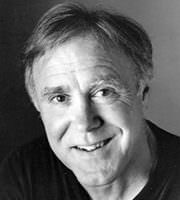by Robert Hass
Little green involute fronds of fern at creekside.
And the sinewy clear water rushing over creekstone
of the palest amber, veined with a darker gold,
thinnest lines of gold rivering through the amber
like—ah, now we come to it. We were not put on earth,
the old man said, he was hacking into the crust
of a sourdough half loaf in his vehement, impatient way
with an old horn-handled knife, to express ourselves.
I knew he had seen whole cities leveled: also
that there had been a time of shame for him, outskirts
of a ruined town, half Baroque, half Greek Revival,
pediments of Flora and Hygeia from a brief eighteenth-century
health spa boom lying on the streets in broken chunks
and dogs scavenging among them. His one act of courage
then had been to drop pieces of bread or chocolate,
as others did, where a fugitive family of Jews
was rumored to be hiding. I never raised my voice,
of course, none of us did. He sliced wedges of cheese
after the bread, spooned out dollops of sour jam
from some Hungarian plum, purple and faintly gingered.
Every day the bits of half-mildewed, dry, hard—
this is my invention—whitened chocolate, dropped furtively
into rubble by the abandoned outbuilding of some suburban
mechanic's shop—but I am sure he said chocolate—
and it comforted no one. We talked in whispers.
"Someone is taking them." "Yes," Janos said,
"But it might just be the dogs." He set the table.
Shrugged. Janos was a friend from the university,
who fled east to join a people's liberation army,
died in Siberia somewhere. Some of us whispered 'art',
he said. Some of us 'truth.' A debate with cut vocal chords.
You have to understand that, for all we knew, the Germans
would be there forever. And if not the Germans, the Russians.
Well, you don't 'have to' understand anything, naturally.
No one knew which way to jump. What we had was language,
you see. Some said art, some said truth. Truth, of course,
was death. Clattered the plates down on the table. No one,
no one said 'self-expression.' Well, you had your own forms
of indulgence. Didn't people in the forties say 'man'
instead of 'the self?' I think I said. I thought 'the self'
came in in 1949. He laughed. It's true. Man,
we said, is the creature who is able to watch himself
eat his own shit from fear. You know what that is?
Melodrama. I tell you, there is no bottom to self-pity.
This comes back to me on the mountainside. Butterflies—
tiny blues with their two-dot wings like quotation marks
or an abandoned pencil sketch of a face. They hover lightly
over lupine blooms, whirr of insects in the three o'clock sun.
What about being? I had asked him. Isn't language responsible
to it, all of it, the texture of bread, the hairstyles
of the girls you knew in high school, shoelaces, sunsets,
the smell of tea? Ah, he said, you've been talking to Milosz.
To Czeslaw I say this: silence preceeds us. We are catching up.
I think he was quoting Jabes whom he liked to read.
Of course, here, gesturing out the window, pines, ragged green
of a winter lawn, the bay, you can express what you like,
enumerate the vegetation. And you! you have to, I'm afraid,
since you don't excel at metaphor. A shrewd, quick glance
to see how I have taken this thrust. You write well, clearly.
You are an intelligent man. But—finger in the air—
silence is waiting. Milosz believes there is a Word
at the end that explains. There is silence at the end,
and it doesn't explain, it doesn't even ask. He spread chutney
on his bread, meticulously, out to the corners. Something
angry always in his unexpected fits of thoroughness
I liked. The cheese. Then a lunging, wolfish bite.
Put it this way, I give you, here, now, a magic key.
What does it open? This key I give you, what exactly
does it open? Anything, anything! But what? I found
that what I thought about was the failure of my marriage,
the three or four lost years just at the end and after.
For me there is no key, not even the sum total of our acts.
But you are a poet. You pretend to make poems. And?
She sat on the couch sobbing, her rib cage shaking
from its accumulated abysses of grief and thick sorrow.
I don't love you, she said. The terrible thing is
that I don't think I ever loved you. He thought to himself
fast, to numb it, that she didn't mean it, thought
what he had done to provoke it. It was May.
Also pines, lawn, the bay, a blossoming apricot.
Everyone their own devastation. Each on its own scale.
I don't know what the key opens. I know we die,
and don't know what is at the end. We don't behave well.
And there are monsters out there, and millions of others
to carry out their orders. We live half our lives
in fantasy, and words. This morning I am pretending
to be walking down the mountain in the heat.
A vault of blue sky, traildust, the sweet medicinal
scent of mountain grasses, and at trailside—
I'm a little ashamed that I want to end this poem
singing, but I want to end this poem singing—the wooly
closed-down buds of the sunflower to which, in English,
someone gave the name, sometime, of pearly everlasting.
Last updated May 14, 2019




